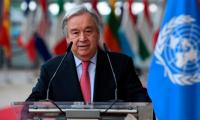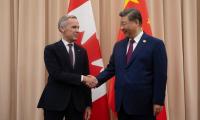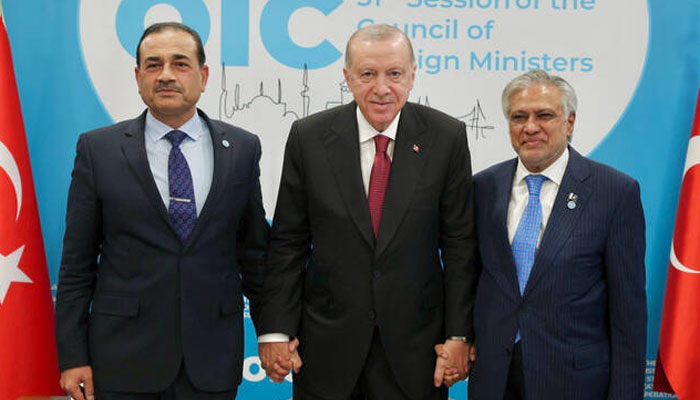Pakistan, Turkiye to step up diplomacy to stop Israel's attacks
Deputy PM Dar, Field Masrhal Munir meet Turkish president on sidelines of OIC huddle in Istanbul
ISTANBUL: Iran expects India and other global allies to condemn Israeli military aggression against it as such actions are breach of international law, a senior Iranian diplomat said.
“We believe every country, including India, should condemn it (Israeli military actions), not because of their relations with Iran but because these actions are in breach of global norms,” Iranian deputy chief of mission in India, Mohammad Javad Hosseini, said, Indian media reported.
As Israel-Iran hostilities persist amid threat of further escalation in regional tensions, Pakistan and Turkiye have agreed to step up diplomacy to halt Israel’s attacks. Deputy Prime Minister Ishaq Dar and Chief of Army Staff (COAS) Army Field Marshal Syed Asim Munir met Turkish President Recep Tayyip Erdogan on Saturday and agreed to step up diplomatic efforts to halt Israel’s military campaigns in the Middle East, Arab News reported.
The meeting took place on the sidelines of the 51st session of the Organisation of Islamic Cooperation (OIC) Council of Foreign Ministers in Istanbul, where Muslim-majority nations are grappling with regional crises.
“The leaders [of Pakistan and Turkiye] expressed strong condemnation of the continued Israeli attacks in blatant violation of fundamental principles of international law, reiterated support for Iran’s sovereignty, territorial integrity and its right to self-defence under the UN Charter, agreed to continue diplomatic efforts to de-escalate the situation, and urged the international community to play its part in restoring peace and stability in the region,” the Foreign Office in Islamabad said in a statement.
“Both sides emphasised the urgency of galvanising efforts to bring an immediate halt to the Israeli aggression in Gaza and unhindered provision of humanitarian assistance to the besieged people of Gaza,” the statement added.
The deputy prime minister conveyed the warm greetings of Prime Minister Shahbaz Sharif to President Erdogan, and underscored the profound importance that Pakistan accorded to its enduring bilateral relations with Turkiye.
Both the leaders reaffirmed their commitment to further deepen and diversify the longstanding brotherly cooperation between the two countries.DPM Dar also congratulated President Erdogan on the Award conferred by the Islamic Cooperation Youth Forum in recognition of his leadership as well as successful holding of the OIC CFM session.
Addressing Arab League diplomats during a OIC meeting, Turkish President Erdo an warned against a “new Sykes-Picot order” in the Middle East and called for stronger solidarity among Islamic nations to counter Israeli actions and regional destabilization, foreign media reported.
“We will not allow the establishment of a new Sykes-Picot order in our region with borders to be drawn in blood,” Erdogan said.He said Israeli Prime Minister Benjamin Netanyahu is the “biggest obstacle to regional peace” and that Israeli attacks on Iran right before a new round of nuclear talks with the United States aimed to sabotage the negotiations.
Erdogan urged countries with influence over Israel not to listen to its “poison” and to seek a solution to the fighting via dialogue without allowing a wider conflict.Israeli attacks on Iran show that Netanyahu “and his government … do not want any issues or any matters to be solved diplomatically,” said Erdogan.
“Netanyahu’s Zionist ambitions have no other purpose than to drag our region and … the whole world into a big disaster,” he added.Erdogan accused the Western leaders of providing “unconditional support” to Israel. He said Turkiye would not allow borders in the Middle East to be redrawn “in blood”.
“It is vital for us to show more solidarity to end Israel’s banditry – not only in Palestine but also in Syria, in Lebanon and in Iran,” he told the OIC gathering.He described the conditions in Gaza as worse than those of Nazi concentration camps, noting that “two million of our sisters and brothers in Gaza have been struggling to survive under these conditions for 21 months.”
Erdogan said over 55,000 Palestinians, more than 65 percent of them women and children, have been killed in Israeli attacks, and 128,000 others have been injured.
Erdogan expressed confidence in the resilience of the Iranian people amid the current conflict. “We have no doubt that the Iranian people, with their solidarity in the face of difficulties and strong state experience, will hopefully overcome these days,” he said.
He strongly condemned Israel’s recent attacks on Iran, emphasizing that Iran’s right to self-defense in the face of state terrorism is natural, legitimate, and legal.Erdogan described Israel’s strikes on Gaza, Lebanon, Yemen, Syria, and Iran as acts of “banditry.”
He also urged Islamic countries to stand firm against Israel’s actions beyond Gaza. “We must show greater solidarity to stop Israel’s acts of banditry not only in Palestine but also in Syria, Lebanon and Iran,” Erdogan added.
Speaking before Erdogan, Turkish Foreign Minister Hakan Fidan accused Israel of leading the Middle East towards “total disaster” by attacking Iran.
“Israel is now leading the region to the brink of total disaster by attacking Iran, our neighbour,” he said. “There is no Palestinian, Lebanese, Syrian, Yemeni or Iranian problem but there is clearly an Israeli problem.”
Meanwhile, Iranian Foreign Minister Abbas Araghchi said it would be “very, very dangerous for everyone” if the United States becomes actively involved in the war with Israel.
He spoke to reporters in Istanbul on his way home from talks in Geneva.Araghchi said American military involvement “would be very unfortunate.”
Iran’s foreign minister said his country cannot negotiate with the US while Israeli bombardment continues.“It is obvious I cannot go to the negotiations with the United States when our people are under bombardment, under the support of the United States,” Araghchi told reporters.
He went on to call for the “aggression” to come to an end “in order for us to come back to diplomacy.”In his address to the OIC FM’s meeting, Saudi Foreign Minister Prince Faisal bin Farhan reaffirmed the kingdom’s unwavering support for the Palestinian. He also condemned the Israeli strikes on Iran, describing them as a “blatant” violation of international law and an infringement on Iranian sovereignty and security.
Prince Faisal underscored the importance Saudi Arabia placed on the Palestinian issue, highlighting the kingdom’s ongoing efforts to end the war in Gaza, alleviate the worsening humanitarian crisis, and unify Arab and Islamic positions on the conflict.
He reiterated Saudi Arabia’s firm support for the establishment of an independent Palestinian state along the 1967 borders with East Jerusalem as its capital.
Turning to the Israeli-Iranian conflict, he said: “These attacks threaten the security and stability of the region,” and called for an immediate halt to military operations, de-escalation, and a return to negotiations between Iran and the international community.
Prince Faisal also reiterated Saudi Arabia’s continued backing of efforts to resolve the crisis in Yemen, expressing support for a comprehensive political solution and the restoration of peace, stability, and security in the country.
Meanwhile, six B-2 stealth bombers from Whiteman Air Force Base in Missouri appear to be en route to a US Air Force base in the Pacific island of Guam, US officials confirmed to Fox News. However, it is not immediately clear whether this is related to escalating tensions in the Middle East.
The bombers apparently refueled after launching from Missouri, suggesting they launched without full fuel tanks due to a heavy onboard payload, which could be bunker-buster bombs.
The B-2 can carry two 15-ton bunker-buster bombs—which only the US possesses. Experts say the bombs could be critical to targeting Iran’s most heavily fortified nuclear site: Fordow.
Mark Dubowitz, CEO of the Foundation for Defence of Democracies, told Fox News Digital that “destroying [Fordow] from the air is a job only the US can do.”
According to Jonathan Ruhe, Director of Foreign Policy for JINSA, the bunker-busters are designed to use the force of gravity to “penetrate through any mixture of earth, rock, and concrete before the bomb itself then explodes” underground. The explosion that ensues could take out the target fully or “collapse the structure” around the target “without necessarily obliterating it,” he explained.
In latest attacks, the Israeli military claimed that it has “eliminated” Behnam Shahriyari, the second Iranian commander in the elite Quds Force of the Islamic Revolutionary Guard Corps to be targeted in Israeli strikes overnight.
The Israeli Air Force killed Shahriyari in his vehicle while he was traveling in western Iran, the Israel Defense Forces said in a statement Saturday.
Separately, Israeli media also claimed that 17 Iranian nuclear scientists have been killed so far.
It reported that a senior nuclear scientist was killed Friday night in an Israeli strike on an apartment in the Iranian capital Tehran, along with two other nuclear experts.Isfahan’s deputy provincial governor was cited by the semi-official Fars news agency saying Israeli airstrikes earlier on Saturday targeted Iran’s largest nuclear research complex.
The United Nations’ nuclear watchdog says a centrifuge workshop in Iran’s nuclear research complex in Isfahan was damaged in Israeli strikes, but there is no danger of hazardous materials leakage.
The workshop manufactured machines used to enrich uranium, according to the International Atomic Energy Agency (IAEA).In an update posted on the IAEA website, Director General Rafael Grossi said the workshop had previously been under IAEA monitoring as part of the Joint Comprehensive Plan of Action — the nuclear deal reached between Iran and world powers in 2015.
“We know this facility well. There was no nuclear material at this site and therefore the attack on it will have no radiological consequences,” Grossi said.Over 400 people have been killed in Iran since the beginning of the Israeli-Iranian conflict last Friday, Iran state broadcaster IRIB reported today, citing Iran’s health ministry. Thousands of people have been injured, it added.
“As of this morning, the Israeli regime’s hands are stained with the blood of 400 defenseless Iranians, and it has injured 3,056 people with its missiles and drones,” the health ministry said, according to IRIB.“Most of the casualties and fatalities were civilians,” it said.
State-linked Tasnim news agency reported earlier on Saturday that Israeli strikes in Iran have killed 54 women and children since June 13, citing government spokesperson Fatemeh Mohajerani.
Meanwhile, two Iranian drones penetrated Israel’s air defences and struck sites in the north and south, according to the Israeli military, marking one of the rare instances in which one-way attack drones from Iran successfully breached Israeli air defences.
The drone in northern Israel struck the town of Beit Shean near the Jordanian border, hitting a two-story home, according to emergency responders.
Images from the scene showed a gaping hole in the side of the building, along with its windows and doors blown out. The area around the home was littered with debris and dirt from the impact.
Magen David Adom (MDA), Israel’s emergency service, said it has not found any casualties at the scene as it continues to search through the rubble.
A second drone pierced Israel’s air defences and landed in an open area in the south of the country, according to the military.The barrage consisted of at least six drones, according to the Israel Defense Forces (IDF).
Meanwhile, The New York Times reported, citing three Iranian officials familiar with the matter, that Iran’s Supreme Leader Ayatollah Ali Khamenei has named three senior clerics as candidates to succeed him should he be killed.
In the event a supreme leader dies, Iran’s constitution requires the Assembly of Experts, an 88-member clerical body, to pick a successor. The process has only been used once since the 1979 Islamic Revolution, when Khamenei himself was elected in 1989.
Khamenei wants to ensure a quick, orderly transition in the event of his death, the Times reported, citing the officials.
The UNHCR said Saturday that the intensity of the attacks is already triggering population movements in Israel and Iran: Some from Tehran and other parts of Iran have crossed into neighbouring countries while shelling has caused people in Israel to seek shelter elsewhere in the country and, in some cases, abroad.
The agency urged states in the region to respect the right of people to seek safety where needed and to facilitate humanitarian access.
“This region has already endured more than its share of war, loss, and displacement — we cannot allow another refugee crisis to take root,” the U.N. High Commissioner for Refugees, Filippo Grandi, said. “The time to de-escalate is right now. Once people are forced to flee, there’s no quick way back — and all too often, the consequences last for generations.”
Internet-access advocacy group NetBlocks.org reported on Saturday that the limited internet access that had come back up in Iran has once again “collapsed.”
The group said on X that the disconnect came after “a brief period when residents could exchange messages with the outside world.”
A nationwide internet shutdown has been in place for several days, isolating Iranians.Later some internet access was restored, giving people the opportunity to call friends and family for the first time in days.
Meanwhile, the US Department of State has begun assisted departure flights from Israel, US Ambassador to Israel Mike Huckabee said on X Saturday. “If you are a U.S. citizen or Lawful Permanent Resident currently in Israel or the West Bank and seeking U.S. government assistance to depart, please complete this form so the Department of State can better assist you and provide you with timely updates: https://mytravel.state.gov/s/crisis-intake,” Huckabee wrote. “If you have only completed the crisis intake form, please do not fill it out again.”
Meanwhile, the Islamic Revolution Guards Corps (IRGC) announced that it had launched missiles toward Israeli-occupied territories to target Ben Gurion Airport and military centres.
IRGC issued its 15th statement, declaring that it launched missiles towards Israeli-occupied territories of Palestine to target Ben Gurion Airport and certain military headquarters, Iran’s Mehr News Agency reported.
The IRGC announced early on Saturday that it initiated the 18th phase of True Promise Operation 3, utilising numerous suicide and combat drones, such as Shahed 136, as well as precision solid-fuel and liquid-fuel missiles.
According to the statement, the IRGC has successfully destroyed predetermined targets at Ben Gurion Airport and military operational logistics centres.
The state-of-the-art defence systems of the regime have failed to intercept the Iranian drones, forcing Israelis to flee to shelters. The Israeli regime’s media outlets reported that six out of ten Iranian missiles hit their targets during the latest round of attacks.
-
 Taiwan, TSMC To Expand US Investment: A Strategic Move In Global AI Chip Race
Taiwan, TSMC To Expand US Investment: A Strategic Move In Global AI Chip Race -
 UN Chief Lashes Out At Countries Violating International Law; Warns 'new Geopolitics' Could Jeopardize World Order
UN Chief Lashes Out At Countries Violating International Law; Warns 'new Geopolitics' Could Jeopardize World Order -
 Carney Meets Xi In Beijing: Key Developments Revealed In The New Canada-China Trade Roadmap
Carney Meets Xi In Beijing: Key Developments Revealed In The New Canada-China Trade Roadmap -
 WhatsApp Adds New Status Privacy Check For Who Can See Your Updates
WhatsApp Adds New Status Privacy Check For Who Can See Your Updates -
 Prince Harry Takes On Dangerous Mission In 2026
Prince Harry Takes On Dangerous Mission In 2026 -
 Trump Accepts Nobel Peace Medal From Machado: What It Means For Venezuela Politics?
Trump Accepts Nobel Peace Medal From Machado: What It Means For Venezuela Politics? -
 Late-night Snacking Linked To Higher Risk Of Liver Disease
Late-night Snacking Linked To Higher Risk Of Liver Disease -
 John Mellencamp Gives Update On Daughter Teddi's Health Struggles: 'She's Suffering'
John Mellencamp Gives Update On Daughter Teddi's Health Struggles: 'She's Suffering' -
 ‘Disturbing Developments’ Start To Follow Prince William, Kate: ‘This Has The Makings Of A Crisis’
‘Disturbing Developments’ Start To Follow Prince William, Kate: ‘This Has The Makings Of A Crisis’ -
 Pamela Anderson Breaks Silence On Fallout With Ex-Tommy Lee: 'I Miss Him'
Pamela Anderson Breaks Silence On Fallout With Ex-Tommy Lee: 'I Miss Him' -
 Andrew Warned: ‘You’re Gonna Add Your Own Final Nail In The Coffin Of Reputation’
Andrew Warned: ‘You’re Gonna Add Your Own Final Nail In The Coffin Of Reputation’ -
 Ben Affleck Doesn't Want His Kids To Join Showbiz: Here's Why
Ben Affleck Doesn't Want His Kids To Join Showbiz: Here's Why -
 George R.R. Martin Calls 'House Of The Dragon' S3 'not My Story'
George R.R. Martin Calls 'House Of The Dragon' S3 'not My Story' -
 Jessi Ngatikaura Gets Real About ‘identity Crisis’ From Facial Surgery
Jessi Ngatikaura Gets Real About ‘identity Crisis’ From Facial Surgery -
 Timothy Busfield Faces Potential 15-year Prison Sentence If Convicted
Timothy Busfield Faces Potential 15-year Prison Sentence If Convicted -
 Kim Kardashian Gushes Over 'baby Girl' Chicago As She Turns 8
Kim Kardashian Gushes Over 'baby Girl' Chicago As She Turns 8




